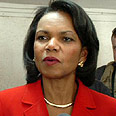
Rice: Iran greatest threat to Mideast we want to see
US secretary of state speaks to Ynet prior to regional visit with President Bush, condemns Iranian foreign policy, says US will defend interests of its allies, Israel chief among them
Rice addressed several key issues in the region, severely condemning Iran’s foreign policy calling the country ”the single greatest threat to the Middle East.” She also reaffirmed US objections to settlement construction in Har Homa and noted that Egypt “must do more” in order to stop arms smuggling to the Gaza Strip.
The secretary of state also said that the US is going to “defend its interests” as well as “the interests of it allies" -- Israel chief among them -- in the face of what she deemed “Iranian provocation” in the region.
“Iran is the single greatest threat to the kind of Middle East that we all want to see,” said Rice. “It’s a supporter of terrorism in Iran, in Lebanon, the Palestinian territories. It has nuclear ambitions. It continues to destabilize fragile democracies. The world will make a very big mistake if it thinks that Iran is not a danger.”
In light of this looming Iranian threat, Rice reaffirmed US commitment to Israel and its other allies in the region.
“We have a stake in Israel’s security and the defense of Israel. It’s similar for our Gulf allies, with whom we’ve had security relation for decades. The US takes those obligations and responsibilities very, very seriously,” she said.
Referring to a recent altercation between Iranian and US warships in the Persian Gulf, Rice said that “Iran should not engage in such provocations . . . It needs to stop.”
Iran’s nuclear program is also on the forefront of Rice’s agenda. Referring to the recent US National Intelligence Estimate (NIE), which indicated that Iran had halted its nuclear program in 2003, Rice said that this in no way means that Iran is no longer a threat.
“There is nothing in the NIE that suggests Iran is not dangerous. The NIE talks about one of the three elements of the nuclear program, which is weaponization. Enrichment and other processes which can lead to the production of fissile material continue…the effort to get even longer-range ballistic missiles continues,” said Rice.
The US secretary of state stressed that international pressure on Iran must continue. “If they halted it (the military nuclear program) they did it apparently because of international pressure, which says to me we want to keep up international pressure. The NIE should not be understood to say that Iran is not a danger.”
Egypt must do more about Gaza smuggling
Addressing events in Israel, Rice reasserted US objections to construction in the West Bank and east Jerusalem settlements, referring specifically to Har Homa. “Har Homa is a settlement that the US has opposed from the very beginning,” she said.
However, Rice also referred to the letter President Bush wrote to former Prime Minister Ariel Sharon "acknowledging that there have been important changes since 1948 and the events of 1967” which must be recognized as part of the Road Map agreement.
When asked about a possible large-scale Israeli military operation in Gaza as a response to ongoing Qassam rocket attacks, Rice noted she “will not speculate on what Israel might do,” though she staunchly maintained that “Israel should not be the subject, of course, of rocket attacks out of Gaza.”
The problem, said the secretary of state, is that “Gaza right now is under the control of Hamas, which is not supportive of the peace process.”
Rice also discussed the situation in Egypt, noting that “Egypt has to do more (regarding arms smuggling to Gaza). Those tunnels have to be dealt with. The will to do it is very important here.”
Rice concluded her interview by emphasizing US commitment both to the peace process as well as to the State of Israel.
“I think that the Palestinians and Israelis both understand that there is a window that is closing because extremists are now penetrating into the Israeli-Palestinian conflict in ways that they have not (before),” she said.
“I also believe that they’ve got a strong relationship both of them (Palestinian Authority President Mahmoud Abbas and Israeli Prime Minister Ehud Olmert) with the US, and with an American president who has a track record of having been the first president to call for a Palestinian state, but who has also been unequivocally, undeniably committed to the defense of Israel.”










